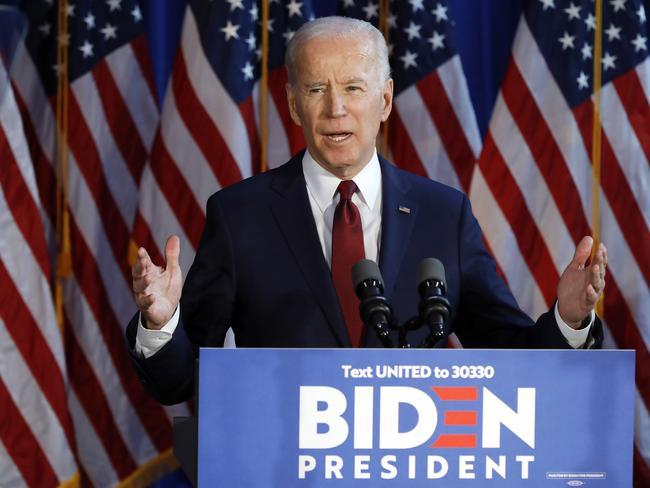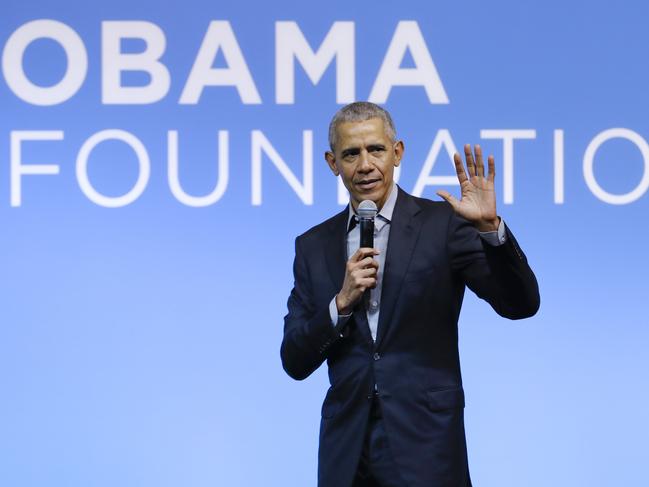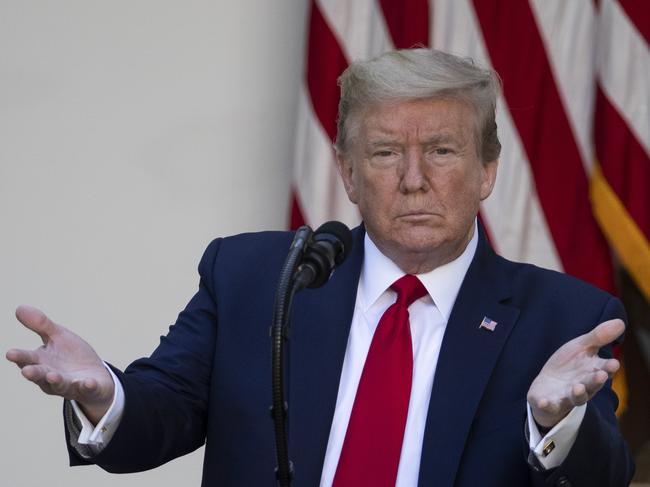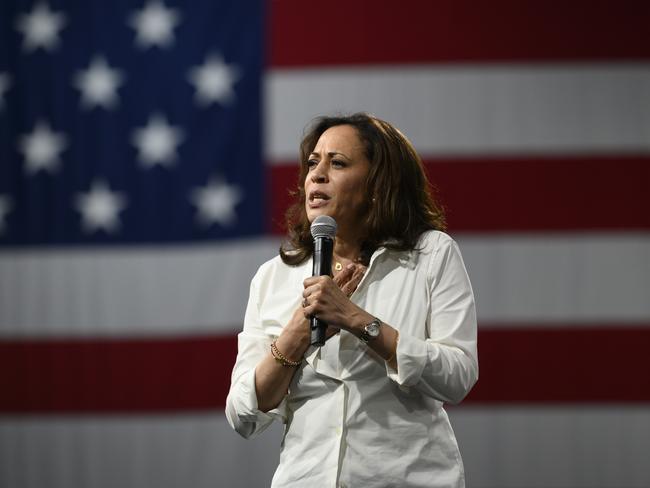US election: Donald Trump and Joe Biden to battle over great unknowns
A strong economy was Donald Trump’s biggest re-election strength before COVID-19. Now, his and Joe Biden’s response to the virus and other uncertainties will make the US race even tougher.
Leaders
Don't miss out on the headlines from Leaders. Followed categories will be added to My News.
When Americans were yesterday learning of the country’s worst employment numbers since the Great Depression, the reaction of their president was a window into how he is setting up to fight the general election.
“Those jobs will all be back, and they’ll be back very soon,” Donald Trump said of the more than 20 million jobs lost in April, bringing the unemployment rate to 14.7 per cent.
“And next year, we’re going to have a phenomenal year. People are ready to go, and safely.”
The president was talking on the phone to his favourite breakfast show, Fox And Friends, and was at the start of a rambling 52-minute interview when the jobs report was released.
“It’s fully expected, there’s no surprise, everybody knows that,” Mr Trump breezed on.
“Somebody said, oh, look at this, well, even the Democrats aren’t blaming me for that. But what I can do is, I’ll bring it back.”

AN ELECTION LIKE NO OTHER
Even before the world turned upside down, the 2020 presidential race was going to be an election like no other.
the biggest question at the start of the year was whether an historically progressive Democratic candidate would end the Trump experiment, now the only focus is survival.
While 12 short weeks ago almost as many voters here considered protecting the environment as important as the economy, the unprecedented job losses and corona contractions have flipped this metric.
When unemployment was at a half century-low of 3.5 per cent in February, Pew research showed 64 per cent of voters considered protecting the environment was their main priority, while 67 per cent said it was strengthening the economy.
Now the battle between the incumbent Donald Trump and presumptive Democrat nominee Joe Biden hinges on the question of how each responds to the crisis.
The coronavirus has not just changed the focus of the election, but how it will play out.
“The pandemic has been the great equaliser for many campaigns, from primaries to the presidential race,” Republican strategist Rina Shah tells News Corp Australia.
With candidates robbed of traditional techniques such as door knocking, baby kissing and rousing rallies, they are turning to new strategies.
“It’s meant that everybody has to figure out how to run a digital campaign overnight,” said Ms Shah.
“Who could have guessed last year or even in January or February that all campaigning would come to a standstill. The winners will be the ones who already had digital strength, or those who adapt fastest.”
Democrats have already postponed their convention a month to August, and there is broad speculation it may be an online event.
Several states including New York cancelled their primary votes for safety reasons, after Bernie Sanders bowed out of the fight and backed Mr Biden.

And yesterday California Governor Gavin Newsom announced every voter in the country’s largest state would be able to vote in November by mail.
“It is entirely a possibility that the entire general election will be vote-by-mail,” said Ms Shah, adding that this would be fought by Republicans, given postal votes historically favour Democrats.
“Depending on where the virus is, if there is another surge when the weather cools, as people are saying, then you might find even the very red states get behind vote by mail because they can’t risk their people.”
THE GREAT UKNOWNS
Mr Biden has also suggested Mr Trump will try to avoid the November poll altogether and “move the election”.
The chances of this are “slim to none”, according to election law expert Joshua Douglas from the University of Kentucky.
“This is probably the question I’ve been asked the most over the past few weeks. No, the November general election date will not change,” Professor Douglas says.

“The US Constitution explicitly says that Congress — and only Congress — sets the date of the presidential election. Even a declaration of “martial law” does not change this fact and would not expand his (Trump’s) powers to delay the election. Congress has passed several laws that dictate in detail the date of the election as well as the date when presidential electors meet. Further, the Constitution explicitly says that the president’s first term will end on January 20, 2021 at noon.”
The other great unknown is in the vice presidential tickets. Vice President Mike Pence has garnered more support for his handling of COVID-19 than at any point in his tenure, and he is considered a far more palatable bet to conservative Republicans than the polarising Mr Trump.
MORE NEWS
‘Good job’; Kim Jong Un congratulates China on virus effort
Restrictions lifted in three steps: how it will affect you

Mr Biden’s apparent physical frailty, at 77, means that even though he has denied he would be a single-term president, his VP pick takes on even more weight than just the fact she will be only the third ever female picked to co-helm a major party in ticket.
Among those being considered for the role are Mr Biden’s former nomination challengers, Elizabeth Warren, Kamala Harris and Amy Klobuchar, as well as Michigan Governor Gretchen Whitmer and prominent Georgia Democrat Stacey Abrams. Although she has said she is not running, Former First Lady Michelle Obama is still being discussed as a dream candidate.
“Joe Biden will not be the most important person on the Democratic ticket this November,” says former senior Obama administration diplomat Brett Bruen.
“Biden’s commitment to select a female running mate means it is her historic opportunity that is going to matter over the long-term for our country.”
Originally published as US election: Donald Trump and Joe Biden to battle over great unknowns
